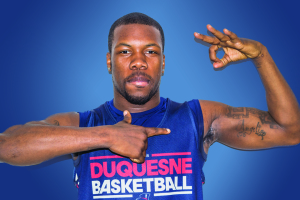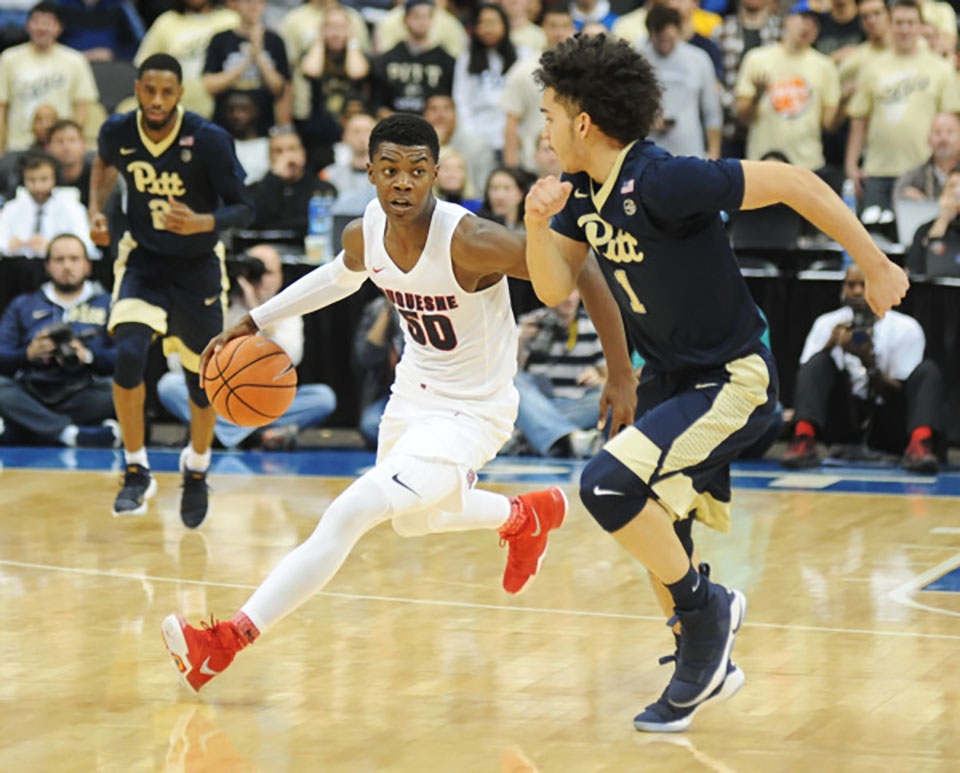
Pat Higgins | Sports Editor
Derrick Colter is smooth on the hardwood. As the primary point guard for the Dukes, he started all 30 games for the Red & Blue last season. He appeared on SportsCenter’s Top-10 on two separate occasions, first for a NBA Street-style “dinner’s served” alley-oop to former Duke Ovie Soko in the preseason, and then for a game-winning floater from beyond the 3-point arc against St. Bonaventure on Jan. 25 at the Palumbo Center.
But after noticing a lump on his neck in March and meeting with doctors following the Atlantic 10 Championship in Brooklyn, “DC” found out last April he’d be facing a much more formidable opponent than any Atlantic 10 competition: non-Hodgkins lymphoma.
Dr. Stanley Marks, the deputy director of clinical services for UPMC and the University of Pittsburgh Cancer Institute, called Colter with the diagnosis while he was home in Maryland over Easter weekend last semester. He felt like the floor had been ripped out from underneath him. He thought he’d lose his hair and fall out of shape. He worried about his future in basketball. The diagnosis was troubling, but once he found out his cancer was treatable, Colter refused to flinch and changed his perspective.
After discussing his options with doctors and coaches, Colter stayed in Pittsburgh over the summer for treatments. On May 1, he began treatment. He was in the doctor’s office every day. Approximately 30 times, he laid face down on a table as red radiation beams killed off the cancer that threatened his future on the court.
Head coach Jim Ferry, who often accompanied his point guard to his radiation treatments, said he saw no change in the way Colter approached every day. After receiving his diagnosis, the first thing Colter wanted to know was whether he could continue working out and playing the game he loves.
“Derrick’s a very humble kid. He expects nothing and he works for everything,” Ferry said. “He approached it as very much business-like. He never cried once, like ‘Why me?’”
Some days, Colter said he felt too tired to do anything; all he wanted to do was sleep. Other days he said he felt good enough, so he’d work out, run the steps at the Palumbo Center and find peace on the basketball court, where he said “everything goes away.” When things got tough, Derrick thought of his big brother JJ, who fought a life-long battle with cerebral palsy and wasn’t supposed to live past his teen years. JJ passed away during Derrick’s freshman year, at age 33.
“I was always telling myself, ‘What would my brother do?’ I got more energy and more confidence and more strength, and it made me a better man every day,” Colter said.
Beating his cancer was Colter’s number one goal, and he did. On June 24, doctors told DC his cancer was in remission.
But in the two months between his diagnosis and remission, basketball always stayed on his mind. He spent a lot of time over the summer with senior swingman and roommate Jeremiah Jones, and junior guard Micah Mason, his counterpart in the Dukes’ backcourt.
Mason said he would often pick Colter up after his treatments. The two would head straight to play pickup with whatever competition they could find, upon Derrick’s request of course.
In a Pittsburgh Pro-Am League game, with Ferry and Marks in attendance, Colter messed around and scored a triple-double (33 points, 10 rebounds and 13 assists). It was a good day.
Stunned by the show, Ferry said Marks reached over to him during the game and said, “This is amazing what he’s doing right now.”
For his teammates, the resilience Derrick has demonstrated through the entire process is nothing new. In fact, they wouldn’t have had any idea their brother was fighting cancer if the coaching staff didn’t gather them together to break the news.
Mason said before coaches gathered the team together to break the news, “you could never tell.”
“DC’s one of the strongest kids I’ve ever met. I thought I was a hard worker until I met DC here. He just went about his life like any other normal person. He never told anyone, he never complained,” he said.
Jones said Colter is “the littlest guy on the team but he’s the toughest.”
His toughness through it all is something from which every player on the squad has taken a lesson, both on and off the court.
Now done with treatments and cancer-free, Colter is back to his day job: going to class and preparing for the Dukes’ upcoming season, which opens against Bluefield State at Palumbo on Nov. 15.
“I just thank the man upstairs everyday man, because it’s a blessing to be out here on the court everyday playing. At first I was thinking about my future, whether I’d be able to play basketball. I just prayed and it’s happening. I got my strength back, I work even harder and I just feel good now.”
Colter says he’s just glad to get back to basketball, and has learned the hard way just how far he can push himself. But when he’s not running the stairs or working on his jumper, he takes time to put things in perspective.
“Some days I just come in here and sit in one of these chairs, and look at the floor and think, ‘Look how lucky I am that I still can play this game that I love.’ Some people can’t even play because they have cancer. I’m just thankful to be able to still play.”
In the coming weeks and months, he’ll be going to hospitals around the city and talking to kids fighting the same battle he fought earlier this summer, to remain positive and keep going.
“If I can do it, they can do it. Anything you put your mind to, you can do,” he said.
He’ll tell them to “just have hope, faith and just keep working hard.”
“Anything you can do is possible.”



